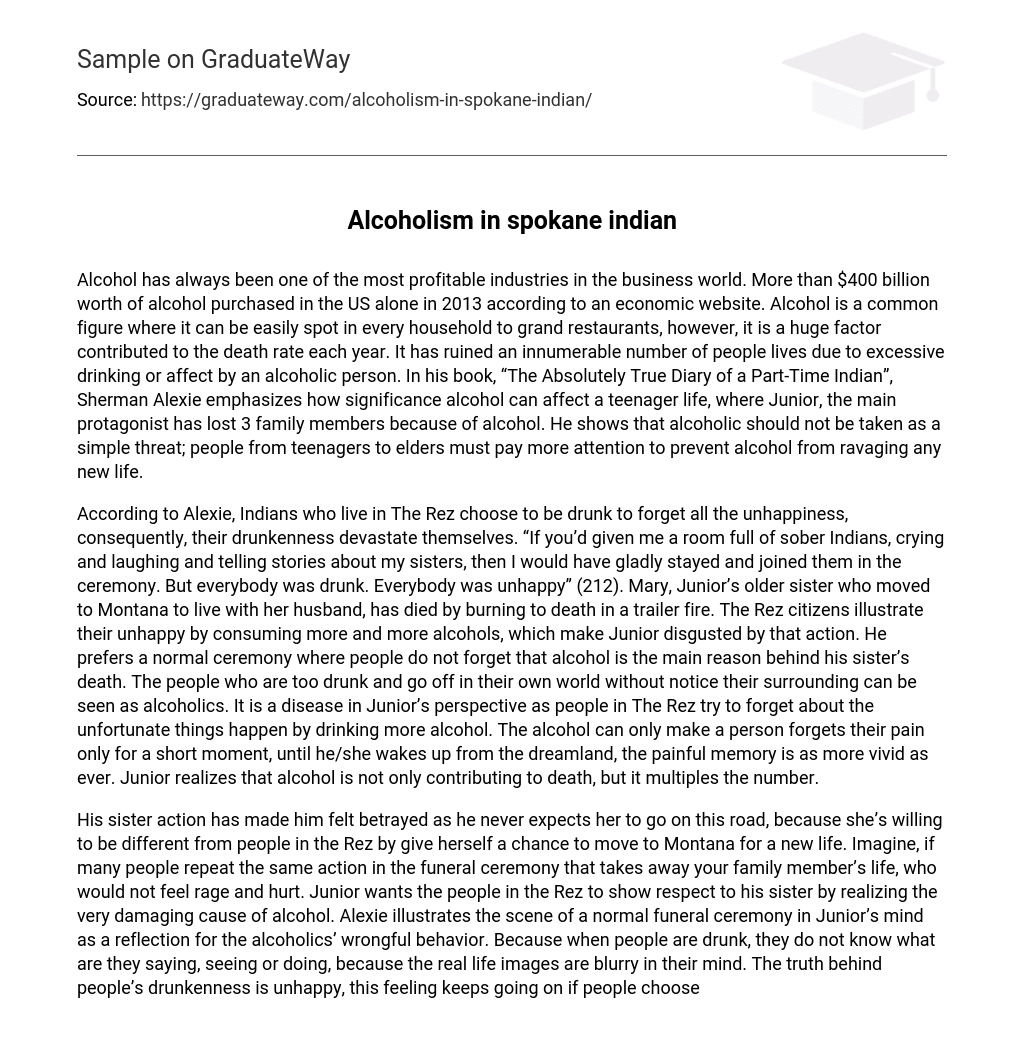Alcohol is a highly profitable industry, with over $400 billion in purchases in the US alone in 2013, as reported by an economic website. It is pervasive, found in households and grand restaurants alike. However, alcohol is also a major contributor to the annual death rate and has ruined countless lives through excessive drinking or being affected by someone who is an alcoholic. In his book, “The Absolutely True Diary of a Part-Time Indian,” Sherman Alexie emphasizes the profound impact alcohol can have on a teenager’s life. The protagonist, Junior, has lost three family members to alcohol, highlighting the seriousness of the issue. Alexie urges people of all ages to pay closer attention and take preventative measures to prevent alcohol from destroying any more lives.
According to Alexie, Indians living in The Rez deliberately choose to intoxicate themselves as a means of escaping their unhappiness, but this only leads to self-destruction. On page 212, Alexie writes, “If you’d given me a room full of sober Indians, crying and laughing and telling stories about my sisters, then I would have gladly stayed and joined them in the ceremony. But everybody was drunk. Everybody was unhappy.” One of the Rez citizens, Mary, Junior’s older sister who had moved to Montana with her husband, tragically died in a trailer fire. The residents of The Rez demonstrate their unhappiness by consuming increasingly more alcohol, which sickens Junior. He longs for a traditional ceremony where alcohol is not used as a means of numbing the pain caused by his sister’s death. Those who drink excessively and detach themselves from reality without acknowledging their surroundings can be viewed as alcoholics. In Junior’s viewpoint, alcoholism is a disease among the people of The Rez who try to forget their misfortunes by drinking more. However, the alcohol only momentarily alleviates the pain until they are jolted back to reality, making the painful memories even more vivid. Junior comes to realize that not only does alcohol contribute to death, but it also multiplies its occurrences.
The unexpected actions of his sister have caused him to feel betrayed. She has chosen to be different from the people on the Reservation and start a new life in Montana. If others were to repeat this action at a funeral, taking someone’s life, it would surely evoke anger and pain. Junior wants the people on the Reservation to understand the devastating consequences of alcohol and show respect for his sister. In Junior’s perspective, Alexie depicts a typical funeral as an illustration of alcoholic behavior gone wrong. When intoxicated, people lose touch with reality and their actions become hazy. The root cause behind their drunkenness is unhappiness which persists if they continue to escape through intoxication. Alexie skillfully creates irony by highlighting how those on the Reservation should honor his sister by being aware and keeping her memory alive through stories, yet they engage in drinking as a means to find happiness without considering that it may lead them down a similar path at another person’s funeral ceremony.Junior’s tone and choice of words convey his exhaustion from repeatedly witnessing this scene. The use of brief sentences effectively delivers a concise and direct message to the reader, captivating their attention by avoiding unnecessary digressions.
The portrayal of Indians in The Rez by Alexie demonstrates how their behavior endangers both themselves and others. According to the author, being intoxicated results in a loss of control over one’s actions, which can have deadly consequences. In the book, it is stated that “THEY ARE NOT SUPPOSED TO GET RUN OVER AND KILLED BY A DRUNK DRIVER! I mean, the thing is, plenty of Indians have died because they were drunk. And plenty of drunken Indians have killed other drunken Indians” (158). Sadly, Junior’s grandmother fell victim to a drunk driver and was fatally injured. This incident emphasizes that many Indians unknowingly take lives while under the influence without fully grasping the severity of their actions. It is heart-wrenching to think that Junior’s grandmother should have peacefully passed away from old age instead of becoming a casualty due to the negligence of an intoxicated driver. Although accidents are unintentional, individuals who consume excessive alcohol knowingly put themselves at risk for such unfortunate circumstances. Spokane Indians like Gerald believe that as long as they are able to safely return home after consuming large amounts of alcohol, the consequences do not matter.
The consequences of their actions may lead to the death of innocent victims, depriving them of the chance to enjoy their remaining lives and burying them underground. It is mentioned that if a car accident occurs, one intoxicated person can cause the death of another individual or even a group. Denise Martinez-Ramundo shares her observations about alcohol abuse on the Pine Ridge Indian Reservation, emphasizing its extent and seriousness. She reveals that children as young as five or six years old have consumed alcoholic drinks, while shockingly stating that 80-90% of adults on the Reservation suffer from severe alcohol abuse issues. Signs promoting safe driving can be seen alongside signs dedicated to remembering those who lost their lives in drunk driving accidents along the streets.
The Pine Ridge Reservation is currently making efforts to overcome this crisis and put an end to alcohol abuse within its boundaries.Similarities can be drawn between this article and “The Absolutely True Diary of a Part-Time Indian” as both depict reservations grappling with alcohol addiction.In the novel, many adults struggle with alcohol addictions, and most deaths are somehow linked to alcohol use.Firstly, Grandma’s life was tragically cut short in a drunk driving accident, followed by Eugene being fatally shot by an intoxicated person.Furthermore, Mary experienced a terrible destiny as she perished in flames because she was heavily intoxicated and unable to perceive the fire engulfing her.Unfortunately, the Pine Ridge Reservation is facing similar problems. This continuous chain of events is incredibly discouraging, and my genuine hope is for these tragic incidents to finally come to an end.





